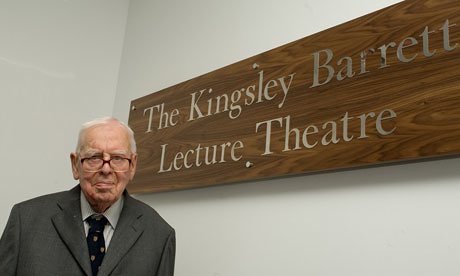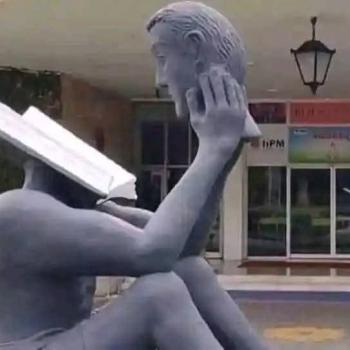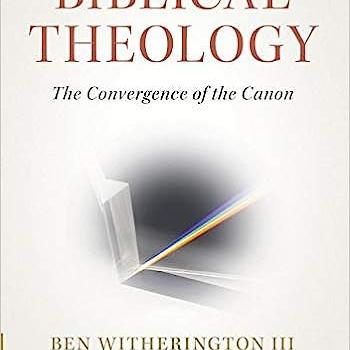(This picture, courtesy of the Guardian, is of CKB at the dedication of the lecture hall in his name in the new Bryson building at Durham University, in 2007. It is one of the last pictures of him in public before he died in 2011).
I am proud to say, I knew Charles Kingsley Barrett pretty well for half my life, for 34 years from 1977-2011. I have of late been working on transcribing his sermons, some of which I was privileged enough to hear in person along the way, both in Durham, and here in the States. He was an excellent preacher as well as a gifted teacher and NT scholar. As I have worked through his many many sermons, a theme that stuck out like a sore thumb as something which needed to be shared with my divided United Methodist Church, are a few lines from a sermon he preached from 2001-05.
He was deeply concerned about how the church had become Biblically illiterate and in fact had abandoned the apostolic teaching, not only in regard to ethics, but even in some respects in regard to theology. Now Kingsley Barrett was no fundamentalist, and could never be accused of being a narrow-minded person. Indeed, he probably would have been uncomfortable with the label Evangelical, if it meant something other than an Evangelist who believes in the apostolic Gospel and preaches it. But that he did believe in whole-heartedly. Here are a few lines from his sermon on Acts 2.42—
“The apostles of the New Testament stand on the shoulders of the prophets and law-givers of the Old Testament: we need them all. A church that does not live by the Scriptures is no longer continuing steadfastly in the apostle’s teaching, and it simply is not the church. Nothing so revives a church as a return to Scripture. This is attested again and again in its history.”
Not for Barrett a pick and choose approach to which part of the Bible applies to us and which doesn’t, or which is inspired and which isn’t. In this he simply follows John Wesley, who believed the whole corpus was inspired by God and profitable for teaching and training in righteousness.
Barrett’s right. Many in our church, even among our leaders, have wandered far from the truth of Scripture both in terms of its theology and its ethics. We have not listened to the exhortation of Paul in Rom. 12 when he tells us not to be conformed to the so-called wisdom and ways of this world, but rather to be transformed through the renewal of our mind through the Scriptures.
The only way for our church to truly be a church, is to return to the apostolic teaching, return to the rock from which we have been hewn, return to a commitment to holiness in heart and in life which necessarily includes a commitment to a Christian view of holy matrimony and what counts as sexual sin. Barrett would tell us that when the day comes that principles about holy living are called mere prejudices, we have ceased to be either the church in general or the Methodist Church of John and Charles Wesley with their insistence on ‘Scriptural holiness’ in particular. Read John Wesley tract on ‘Thoughts on Celibacy’. He would be having a fit over what some of our conferences and bishops are up to these days.
The only way forward for our church is to return to the apostolic teaching, return to a renewed preaching of God’s holy Word, and pray hard for a revival that renews us all in the image of Christ– for all of us, and I do mean all of us, have sinned and fallen short of God’s glory, but that gives us no excuse at all to baptize sin and call it good.
God never created any of us to be sinners, or to be justifiers of our various sins. And the very first words out of Jesus’ mouth when he began preaching was ‘repent for the Kingdom of God is at hand’ (Mk. 1.15). I pray that we listen, and instead of making all kinds of smoked-filled room deals, we will clear the air and get out there spreading Scriptural holiness throughout the land before the United Methodist Church becomes the Untied Methodist Church.

















